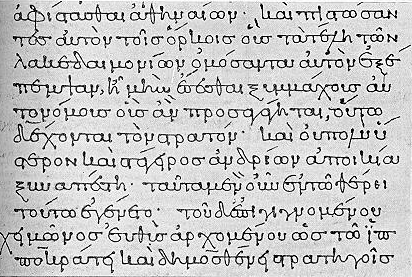
When did people start using punctuation? The Greeks were the first people to use punctuation, but the Bible made it commonplace.
Most early languages used a writing system that was based on images. There was no need for punctuation or even spaces because the ideas were contained in the symbols. Modern languages like Japanese and Chinese still don’t use spaces. However, when languages evolved into an alphabet style, it became far more difficult to read them. Even so, many languages still didn’t use spaces. The main reason for this is that the majority of people could not read and texts were usually designed to be read out loud by a trained performer, who would have memorized the text and who would insert breaks wherever he or she felt they befitted the telling. Orating was a highly prized skill and nobody expected anybody to be able to sight-read a document. Orators would rehearse before a debate. Punctuation evolved from the need to add speaking aids so that untrained people could read the piece aloud correctly.
The first known use of punctuation was on the Mesha Stele. It is a stone from 840 BC that has a text about the god of Moab on it. It is written in a form of the Phoenician alphabet and it uses carved dots between words and horizontal strokes between sense sections.
Aristophanes, a Greek librarian at the Library of Alexandria, was the first person to use pronunciation in written texts. He became head librarian at the library when he was 60 years old, in about 200 BC. Greek was written with no spaces and it was difficult to decipher. He came up with a set of three points that would indicate to the reader the length of the pause necessary. He used a dot at the top, middle, and bottom of the line. The dot in the middle ・ was for a short pause after a komma (a short passage. The dot at the bottom . was for a pause after a kolon (a longer passage). The dot at the top ˙ was for a periodos (a very long pause). This is obviously where our words “comma”, “colon”, and “period” come from. His punctuation didn’t catch on because the Romans embraced more of an oratorial tradition and they didn’t think orators should have aids for how to read.
Punctuation came back in force with Christianity. Christianity started as an oral tradition, in the same way as all other religions, but the problem with an oral religion is that it can change with every telling. To fix this, the first Bible was written in about 120 AD. The vast majority of people still couldn’t read, so someone would need to read the Bible aloud to them. Priests didn’t have the years of training that the orators of Greece and Rome had, so a system of pronunciation was introduced to make it easier for them to read the Bible. A lot of people would add their own punctuation and notation.
In the 7th and 8th centuries, several things happened that had a huge impact on punctuation. The first was that the Holy Roman Emperor Charlemagne set up a school for monks in 782 AD at Aachen. He was worried that learning was being lost and the word of God was not being taught correctly. As the Holy Roman Emperor, he saw it as his duty to do something. He put the Anglo-Saxon monk Alcuin of York in charge of the school and a consistent writing style with consistent spelling was introduced.
As well as this, Irish and Anglo-Saxon monks started to use spaces between words. Aristophanes’ system was reintroduced and reinvented. Lowercase letters were introduced along with indentation and paragraphs started to be based on ideas, rather than just pauses. A lot of these changes came about because the people who were reading the texts were not native speakers of Latin and needed help to read the unfamiliar language.
In the 8th to 10th centuries, punctuation that indicated how the voice should be modulated was introduced. They used rising lines or falling lines for inflection. Some of it was borrowed from the musical notation used in Gregorian chants.
All of this punctuation was suddenly standardized with the introduction of the printing press in the 1450s. As more books were produced, more people learned to read, and the idea of a book changed from something that should be read out loud in public to something that could be read silently at home. When people read silently, they read far more quickly and they don’t have time to think about the structure of what they are reading. Punctuation had to be adapted to show structure and the relationships between words and thought groups.
There have been a few advances since then, but most advances have been in how punctuation is used rather than introducing new punctuation. Ben Jonson wrote a book called English Grammar in1617 and he tried to set out the usage of punctuation. Other people tried the same, but by the 18th century, punctuation was vastly overused. It was not until the publication of The King’s English in 1906 that punctuation was technically standardized.
So, when did people start using punctuation? The Greeks first used it, but it was the Bible that caused it to evolve. The printing press helped, but it wasn’t until last century that punctuation was sorted out. And this is what I learned today.
Sources:
https://en.wikipedia.org/wiki/Aristophanes_of_Byzantium
https://en.wikipedia.org/wiki/Space_(punctuation)
https://en.wikipedia.org/wiki/Punctuation
https://www.britannica.com/topic/punctuation/Punctuation-in-English-since-1600
https://unravellingmag.com/articles/history-punctuation-english/
https://archive.ph/20050308135347/http://www.completetranslation.com/punctuation.htm
https://www.bbc.com/culture/article/20150902-the-mysterious-origins-of-punctuation
http://www.todayifoundout.com/index.php/2016/05/origins-punctuation-marks/
